Peter MALONE
Saturday, 18 September 2021 19:52
Last Enemy, The
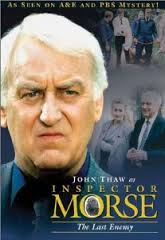
THE LAST ENEMY
UK, 1989, 100 minutes, Colour.
John Thaw, Kevin Whately, Barry Foster, Amanda Hillwood, Michael Aldridge, Tenniel Evans, Lana Morris, James Grout.
Directed by James Scott.
The Last Enemy is one of the earlier Inspector Morse stories. It has a very distinctive Oxford setting, amongst the world of academia, the ambitions and the political rivalries, leading to murder.
The film opens with the discovery of the dismembered body, which leaves Morse and Lewis to visits to London, visits to the Master of Beaumont College and learning about the intricacies of university politics. at the film uses many locations in the colleges creating the academic atmosphere.
Barry Foster, often a villain as in Hitchcock’s Frenzy, is the ambitious master of the College. Amending who would is the forensic doctor. And veterinary Lana Morris steals her scenes as a flirtatious landlady in London.
There are some revelation of Morse’s past life, his studies, rivalries with the Master, the presence of a woman and more saying that he had a good memory but prosaic character. And, for much of the film, Morse is suffering from toothache.
1. The popularity of the long-running series? Television movies? With style? The popularity of Morse and his personality, enigmatic and mannered style? The personality of Lewis? Their relationship? The solving of the crimes? Intricacy of the plot? The psychological dimensions, the mystery and clues? Police work and solving the mysteries with their own abilities? The work of Colin Dexter?
2. The Oxford settings, the city and landscapes, the cityscapes, the buildings? Comments about Oxford and Oxford society? The ironies about Oxford and the dons? The university city? Ordinary people? Their interconnections? So much beauty – and so much crime?
3. The quality of the mystery, character-driven? Sufficient information, sufficient clues? The exploration of character and clues?
4. John Thaw as Morse, his personality, the changes over the years, yet remaining the same? The mystery of his name? His crusty manner, the bachelor (but romantic at times)? His own authority – exercised over Lewis – and his reaction to authorities? Promotion or not? The changing of his attitudes towards Lewis, bossing him, patronising him about education and culture? The issue of music? Drinking ale? His car? Quietly at home, at work? With Lewis, understanding the situations and characters, the deductions? His being a good listener – but critical?
5. The contrast with Lewis, the family man, the ordinary policeman, education and lack of education, his being put down by Morse – but enjoying his comeuppance now and again? Music and his ignorance? The first reactions, Lewis being patient? His admiration for Morse, having to do so much leg work, to formulate hypotheses? Working under pressure? Collaborator and partner of Morse?
6. The police authorities in Oxford? The medical examiners – and Morse and his attitude towards the female authorities? Sexist and patronising? Changing?
7. The quality of the film as a crime thriller, a thriller with intelligence and demands on the audience?
8. The introduction to the crime, the credits, the background in Oxford, beyond?
9. The range of personalities, motives? Truth and concealment? Jealousies? Deceits and angers? The academic and religious backgrounds?
10. The opening with the dead body, hacked to pieces, investigations, the eventual identification of the victim, the back story?
11. Morse called to the master of Beaumont College, the past connections, the discussions, the lunch and its boredom? Morse noticing Miss Burns? Later meeting her in London, hearing her story, her suspicions, Kerridge and his opposition, learning about the master from Kerridge? Her later seeing the Master, his hold over her, issues of plagiarism, his death?
12. The Oxford politics, promotions, Drysdale, enmities, his cancer, going to Italy? Kerridge, his books, antagonism, homosexuality, the fear of scandal? The Master coming through this, his promotion, the Sheldonian lecture, its prestige, his political contacts and influence, the possibility for his heading a Royal commission, Ballarat not putting his name forward?
13. The domestic sequences, Morse and his affability, despite his toothache and the visit to the dentist, with the Master’s secretary, taking her out for a drink, Dr Russell, the drink on her birthday, her friend arriving? Morse and his never marrying? The contrast with Lewis, talk about his family and his children?
14. Morse and Lewis, the visits to London, the research, visiting Kerridge’s flat, the flirtatious landlady, the visit to Whitehall and the discussions with the political adviser? Morse criticising Lewis’s driving?
15. The chief superintendent, always wanting appearances to be satisfactory, putting Morse down, having to admit the truth?
16. Kerridge, the television letter, the same with the Master? The setup?
17. The murders, Drysdale and his plan, killing Ballarat, Ballarat running off with his wife years earlier? The attempt on Kerridge, Kerridge telling the truth, the Master killing Kerridge? Drysdale and his shooting the Master?
18. A satisfactory Morse murder mystery?
Published in Movie Reviews
Published in
Movie Reviews
Tagged under
Saturday, 18 September 2021 19:52
Loser
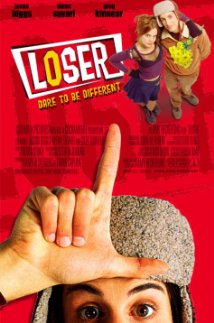
LOSER
US, 2000, 98 minutes, Colour.
Jason Biggs, Mena Suvari, Zak Orth, Thomas Sadoski, Jimmi Simpson, Greg Kinnear, Dan Aykroyd, Colleen Camp, Andy Dick.
Directed by Amy Heckerling.
Amy Heckerling is noted for two teenage comedies, Fast Times at Ridgemont High in the 80s and the sly adapation of Jane Austen's Emma as Clueless in the 90s. Loser is in the same vein although the focus is on Jason Biggs as the underdog, the nice boy from the midwest on scholarship who is victimised by his rich and useless roommates. He befriends Mena Suvari (the girl from American Beauty) who is having an affair with their lecturer (a supersmug Greg Kinnear). Of course, it will all end up well, but it is the trials and tribulations and how our hero handles them which keep the interest - although it will be of more interest to teenage audiences.
1. A pleasing film? A pleasant central character? His adventures in the city, finding himself, realising the pretensions of others, and genuine love and affection?
2. The irony of the title, Paul and his character, at home, successful, the support of his father and the family, his treatment by the other students, his pratfalls, Prof Alcott and his disdain? But Paul’s conscientiousness, scholarship, his study, trying to be friendly, accepting the insults of his mates, his friendship with Dora, affection, love, helping her, at the pet centre, confronting Prof Alcott? Dora and her perceiving him to be genuine?
3. The contrast between the midwest, the home, the farm, the way of life and the University College, the idle students, their behaviour, their exploiting people?
4. Paul and his arrival, his cap, the room, meeting the roommates, their treatment, his trying to study with all the noise, buying the six pack, the meeting and his being ousted, finding accommodation at the pet centre, working with the animals? The parties, the drugs, his buying the substitutes and getting rid of the date rape drugs? Talking with Allcott about his scholarship and Alcott’s attitude to him and finally giving him a low mark to fail him? His good sense in changing his subjects?
5. His arriving in class, falling down the steps, sitting next to Dora, her helping him? Later meeting her, walking with her, talking, helping with jobs, invitation to the concert, her not arriving, discovering that she was drugged? His helping with jobs? The pizza and the video, and her going back to the professor? His confrontation with the Prof Alcott, thinking that Paul was in on the blackmail? His final confrontation, Alcott realising that? Dora coming to the centre, love, the kiss, a future?
6. Prof Alcott, snob, the relationship with Dora, a professor exploiting a student? Her moving in, his petty demands, finnickity? Dora herself, her age, flattered by Alcott, the sexual relationship, his talking down to her in class? The job, at the club, not getting enough money, the clients? Her being fired? Nowhere to stay, ringing her mother, getting the bag lady to pretend that it was the College? The job applications, her failures? The job and the ovaries for experimentation? Meeting with Paul, helping him in class, the friendship, his inviting her to the centre, the episode with the kittens? Her affection for Paul? The concert, the drugs, the hospital, Paul sending the flowers in Allcot’s name? His caring for her? Her going back to Alcott, even with his demands, her realising the truth? Leaving?
7. The character of the roommates, wealthy, no study, cheating, drink, practical jokes, the parties, the drugs? Paul and his confronting them? Their blackmailing Allcott?
8. The information before the final credits, Paul and Dora, the fate of the roommates, prison, overdoses and mental problems? Alcott and his being in jail?
9. The realism of the plot but seen from the perspective of good young man?
Published in Movie Reviews
Published in
Movie Reviews
Tagged under
Saturday, 18 September 2021 19:52
John Doe, Vigilante
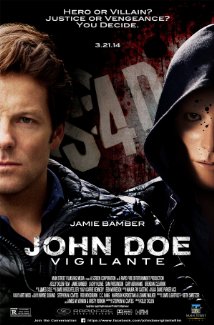
JOHN DOE VIGILANTE
Australia, 2014, 90 minutes, Colour.
Jamie Bamber, Lachy Hulme.
Directed by Kelly Dolen.
To say a film is interesting is not meant to be put-down. If the film is considered interesting, it is stimulating, emotionally involving, giving the audience a challenge and something to reflect on.
It can be said, definitely, that John Doe Vigilantes is interesting, even confronting.
But that is not to say that all audiences will want to have this experience. This is a story, set in Melbourne and using Melbourne and locations effectively, about a serial killer who is called John Doe. When it comes to screen vigilantes, many might remember Charles Bronson in the Death Wish series in the 1970s and 1980s, a man whose family has been violently assaulted and who feels that justice cannot be done by the legal system and so takes the law into his own hands, wreaking vengeance. A more recent example is Denzel Washington in The Equaliser, a seemingly virtuous man, edifying even, who goes to the defence of a young girl and turns into an exterminator of hyper-exploitative gangsters.
The thing is that the audience found these men of vengeance initially sympathetic, and found that what they were doing was righting wrong. John Doe is definitely not sympathetic. His serial killing (some of it shown in harsh or suggested detail, especially the intense confrontation with a brutal childkiller) has as its target criminals who have moved beyond the justice system or those who have served time, been paroled and offend again.
At the opening of the film, the verdict is about to be given in his trial. The screenplay introduces a journalist, played by Lachy Hulme, whom John Doe has allowed to interview him. This gives the audience the opportunity to look at and listen to John Doe, rather phlegmatic as he talks to and listens to the journalist, remembering the various episodes. Within the interview, there are many flashbacks, the first focusing on a paedophile priest, his treatment of a little girl, and he is killing being taped. John Doe tapes many of his killings and forms an alliance with a television interviewer, sending him the tapes for newscasts.
This introduces a theme which is most significant in the film, the role of the media. We have the journalist interviewing John Doe, who goes about his investigative work by interviewing an array of people, the police, psychiatrists, the television journalist, the producer of the program, and some ordinary people in the street. This raises the issue of exploitation by the media and individuals and communities allowing themselves to be manipulated.
By this device, the film-makers are able to introduce all aspects of serial killing and vigilantes killings, for and against, nuances of Justice, difficulties of law enforcement and prison sentences, the role of parole, the different perspectives of the media, exploitative or restricted, and the attitudes of people who want to watch the videos of the killings and those who do not. This means that the audience may be shifting positions all the way through the film, approving, disapproving, being challenged, thining that some episodes might be exploitative or necessary for the message of the film, wondering about their own stances.
The film focuses on several of John Doe’s more than thirty victims, and abusive husband, brutal bouncers at nightclubs, horriblel abusers and killers of children… The point that John Doe makes is that they have escaped the law but deserve to be punished rather than to be kept alive at the taxpayers’ expense.
Another effect is the influence of the vigilante vengeance on the public, demonstrations in favour of the vigilantes, and individuals who set up posses, inflamed by their hate and wreaking Justice, or what they think to be justice, and indulging their vicious passions. The journalist raises the question for John Doe and whether he enjoyed his killing or not.
Lachy Hulme is very good and insistent as the investigative journalist, wondering why he has been chosen – and finding out with something of a shock. Jamie Bamber (British but working extensively on US TV) is intense as John Doe, though given some humane moments in video material with his wife and daughter.
The ending, dramatically speaking, is quite clever, though it will give audiences reason to reflect because it comes so suddenly.
This is a well written and directed film, which is definitely not an entertaining night out, but a contribution to issues about the law, justice, vigilantes.
1. A small and intense film? Its a message?
2. The title, the anonymous character, the anonymous citizen? Becoming vigilante?
3. Melbourne story, the use of the city, Parliament buildings, the streets, the bays and the docks? The musical score?
4. The dramatic structure: information about John Doe, the court, expecting the verdict, the interviews, the flashbacks, the particular targets, the role of the media, the experts, the disciples and vigilantes, the explosive ending? The overall impact?
5. John Doe and his case, the sittings in the court, the verdict, audience and response?
6. The decision for the interviews, John Doe permitting, the journalist, in himself, confident, the audience believing in him? why he was chosen – and the clues of torture throughout the film, audiences noting them or not? The journalist, his questions, psychological aspects, discovering more and more, his interviewing other people, the psychologist, the various experts, the police, the media and the boss, the television interviewer? Building up the profile of John Doe, his motives?
7. John Doe, ordinary, his job, his wife and child, deaths, anger? In proportion, out of proportion?
8. The difference between justice and the law? The killing of his family? His decision to get revenge, clever, capturing everything on video, his reputation through the media, the interviewer building him up? The playing of the material on television? The effect on those watching, individuals, in the hotel?
9. A masked avenger? His different targets, the abusive priest, the violent bouncer, the domestic violence, the child killer? The images of these perpetrators? Scenes of their crimes? Topical, resonating with the audiences?
10. The long interview with the child killer, his denials, excuses, anger, admissions? Death?
11. The issues of right and wrong, the arguments, for his vengeance work, against him being a vigilante? The audiences asked to make up their minds?
12. The killing of the interviewer, its suddenness, the reasons and his being a legitimate target because of his violence?
13. The followers, the young man, the interviews, the public response, the arguments for and against, the final bombs, the consequences of the vigilante action?
Published in Movie Reviews
Published in
Movie Reviews
Tagged under
Saturday, 18 September 2021 19:52
Boy Slaves
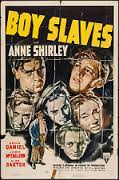
BOY SLAVES
US, 1939, 72 minutes, Black and white.
Roger Daniel, James Mc Callion, Anne Shirley, Alan Baxter, Charles Lane.
Boy Slaves is a little seen film from RKO just prior to World War II. It was directed by P.J.Wolfson, the only film he directed, while being a prominent writer and producer.
This is a social-minded film, focusing on runaway boys, as well as physical abuse by parents. The central character is Jesse, abused at home, running away, attacked by a gang of boys but then becoming part of their life, hiding from authorities, stealing, finding accommodation, finding meals, and the camaraderie between them. (Interestingly for these times, one of the members of the gang is African- American.)
When they are called before the judge, an industrialist named Albee (Charles Lane) offers to take them on as workers in his turpentine plant. The film shows his oppressive regime, no respect for the boys, until two of them die.
When Albee is called into court, he is found guilty by the judge of treating the boys badly – and the judge delivers quite a patriotic speech about the United States, its vision, its justice, a speech full of hope and arousing of the audience.
A curiosity film, but with a sense of social justice in the aftermath of the Depression and concern about the welfare of children.
Published in Movie Reviews
Published in
Movie Reviews
Tagged under
Saturday, 18 September 2021 19:52
Lost Squadron, The
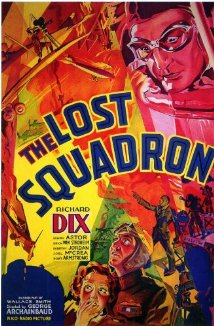
THE LOST SQUADRON
US, 1932, 79 minutes, Black and white.
Richard Dix, Mary Astor, Robert Armstrong, Dorothy Jordan, Joel Mc Rea, Erich von Stroheim, Hugh Herbert.
Directed by George Archainbaud.
In the early 1930s films with aviation themes were very popular, promoted by Howard Hughes and such directors as Howard Hawks, Hell’s Angels. This offered the opportunity for experiments in camera work, especially for flight sequences.
This is a small film within this context. It opens on 11 November 1918, some aerial dogfights, and some deaths, just before the time for the Armistice. The sequences offer an atmosphere of World War I and lead to its aftermath. There is great camaraderie between three of the fighters, played by Richard Dix, a popular star of films in the 1920s to the 1940s, Robert Armstrong, a character actor who was to appear in King Kong the next year, and Joel Mc Rea at the beginning of his 30 year star career in Hollywood. Their mechanic, with a touch of inebriation, indicating the comic style that he used in many films after this, is played by Hugh Herbert. There is some happy carousing at the end of the war.
The friends intend to keep in touch but there are some sequences where two of them try to find jobs, find that after the war their positions have been retrenched and there is little hope in finding jobs. This is an interesting observation about the treatment of veterans returning from war and the way they are treated by society, something seen 14 years later, after the end of World War II, in The Best Years of Our Lives. It was also a theme during and after the Vietnam war.
However, one of the group, Woody, is able to continue his work in flying by doing stunt sequences for Hollywood movies. The other two and their mechanic head to Hollywood, see their friend on the red carpet at a Hollywood premiere when he moves away from the crowd to talk with them. They are offered jobs, initially turning them down, but enjoying their stunt work and their flying, even some daredevil stunts.
On the personal level, Gibson, played by Richard Dix, goes to see his former sweetheart, Mary Astor at the beginning of her career, and finds that she has married a director to further her theatrical career. He is played by the veteran actor and director, Erich von Stroheim, with his characteristic Germanic authoritarianism and sneer – but also in campy be kind of way.
At the end, the film turns towards melodrama at the end when the director pours acid on one of the cables on Woody’s plane. Gibson flies up to warn him, but the realisation is too late and Woody crashes to the ground. The other pilots abduct the director, tie him up, accuse him of murder – then there is a struggle, with a gun, and the director is killed. The question is who is responsible.
Quite a lot of action is packed into the almost 80 minutes of the running time, from the war, to the difficulties for the veterans after the war, to scenes of Hollywood, and the making of World War I pictures and the work of stunt pilots.
Published in Movie Reviews
Published in
Movie Reviews
Tagged under
Saturday, 18 September 2021 19:52
Mysterious Doctor, The
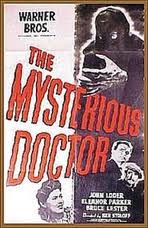
THE MYSTERIOUS DOCTOR
US, 1943, 57 minutes, Black-and-white.
John Loder, Eleanor Parker, Bruce Lester, Lester Matthews, Matt Willis.
Directed by Ben Stolloff.
The Mysterious Doctor is a brief programmer from Warner Brothers, a contribution to the war propaganda effort in 1943.
It echoes such films as Jamaica Inn, set in Cornwall, a mysterious smuggling setting, a mining town where there has been death in the mines and the superstitious locals have created this image of a headless ghost which walks the Moors and fear of it prevents the miners going back to work.
The film opens with a stranger on a walking tour, a doctor, who is welcomed into the village by the local inebriate and gossip, is given accommodation, and finds out about the village and the superstitions from a driver in a cart who gives him a lift. The local Lord who is concerned about his village also arives at the inn for a drink. But soon there is news of a murder and the doctor is under suspicion. Those who are versed in the ways of this kind of film will immediately suspect the aristocrat and will not be incorrect.
Men go to the mine to search, wearing gas masks because of the poison gas allegedly in the mine. The audience sees the innkeeper, who wears a mask because of his disfigured face in a mine explosion, being killed. However, a man wearing the mask reappears and acts as the innkeeper – eventually revealed as the doctor who is conducting investigations into the mine.
There is an emotional scene when the children mock a local man with mental disabilities. Heis rescued by the Innkeeper’s daughter, a typical feisty performance from Eleanor Parker in one of her earliest roles. She urges him to look after the doctor and when the doctor is assumed dead, he is under suspicion and locked up. The young military officer, in love with the innkeeper’s daughter, of course, is very severe in his judgement about the retarded man. The young woman defence him at all costs.
There is a swift build-up to a climax, the discovery of a secret passage from the mine into the Lord’s home, a confrontation with him as he shoots the retarded man who still has enough energy to rescue the young woman and contribute to the downfall of the Lord. The aristocrat is given an explanation that his ancestors came from Germany at the time of George I, established the village and the mine, and with the outbreak of the war, he is still loyal to his German ancestors and German patriotism.
This does mean that there is quite a lot of action in the brief running time, memories of the look and the action of other films set in Cornwall, British superstitions, the role of the mines, the aristocracy and their duplicity – with patriotism and a touch of romance.
Published in Movie Reviews
Published in
Movie Reviews
Tagged under
Saturday, 18 September 2021 19:52
Sarnos, The: A Life in Dirty Movies
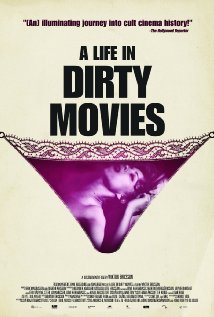
THE SARNOS: A LIFE IN DIRTY MOVIES
Sweden, 2013, 80 minutes, Colour.
Joseph W. Sarno, Peggy Steffans, Michael Bowen, Michael Raso, Matthew Sarno, Annie Sprinkle, John Waters.
Directed by Wiktor Ericsson.
This is a portrait and a biography of film director, Joseph W. Sarno, and his wife of many decades, Peggy Steffans. It was made during 2012 – 2013 in what turned out to be the last months of Sarno’s life, his dying at the age of 89.
Sarno began making films in the 1950s, Sexploitation films, rather than the explicit pornography which was to develop in later decades. Sexploitation seems the correct title whether people judge the films as pornographic or not.
Quite a number of talking heads appear in the film, especially historians, curators of film, Sarno’s producer, his editor, and his son. Prominent director, John Waters, also appears with his characteristic insights and comments, always the touch of humorous irony.
For those interested in the history of cinema, especially in the United States and, with extension to Sweden, the film is of interest whether Sarno and his work are approved of or not. The director himself is quite frank about his films, about how sex films are made, are to be well-written, with some plot and characterisation rather than blunt action. We see the director in his late 80s, reminiscing about his life and films, his intention to make the films he wanted, not watching other exploitation films, but also conscious of what audiences wanted.
His earliest films are in black and white, with quite striking photography and lighting. Sarno and his wife were interested in Ingmar Bergman’s films and there are echoes of his style and lighting. However, with the arrival of a number of makers of sex films, the transition to colour, his later films appear somewhat gaudy and tend to pander to audience curiosity. John Waters reminds audiences of restrictions in the past and how the films of the 50s and 60s caught the attention of younger audiences like himself.
Sarno, at this time, is wanting to make a new film, has written it, has shown it to the money people who feel that there is no profit in it, especially with computers and downloading. And his wife has to explain to him that some of his dramatic devices, like middle-class women in the 21st century ringing each other from phone booths and his not realising that he had to include cellphones.
One of the interesting features is that the Sarnos went to Sweden in the 1960s and began to make films there, liking Sweden so much that they returned year by year, had a house there, which served as a kind of domestic Museum for all the aspects of their films.
Whether you agree with him or not, Joe Sarno is quite a genial character. The film is also a portrait of his wife Peggy, with some flashback material, and her not appearing in the films as a sex actor, but supporting her husband, designing the costumes for the films. She is a strong-minded character, looking after her husband in his old age, shielding him from financial realities, concerned about his health, caring for him, going to visit her almost-100-year-old mother who had initially disliked Sarno, and not seen his films, but had got used to her daughter being with him. There could have been more of her because she is an interesting inarticulate character.
Sarno is gratified that at the end of his life he has had some recognition. He and Peggy are welcome to*retrospective in London at the British film Institute and the National Theatre. And when he dies, Peggy happily displays the large obituary at the top of the page in the New York Times.
There had been a documentary in 2011, Sarno and his Sexual Obsession.
Published in Movie Reviews
Published in
Movie Reviews
Tagged under
Saturday, 18 September 2021 19:52
True Lies
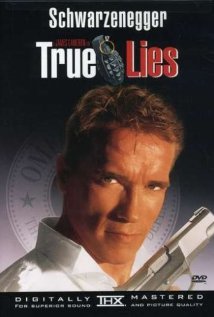
TRUE LIES
US, 1994, 141 minutes, Colour.
Arnold Schwarzenegger, Jamie Lee Curtis, Tom Arnold, Bill Paxton, Tia Carrere, Art Malik, Eliza Dushku, Grant Heslov, Charleton Heston.
Directed by James Cameron.
The writer and director of this film, an adaptation of a French film, La Totale!, with Thierry Lhermitte and Miou- Miou, and directed by Claude Zidi, is James Cameron. He had worked with Arnold Schwarzenegger in the two Terminator films and had made Piranha, Aliens and The Abyss. Titanic was only three years away.
For a while, it looks as if this might be Schwarzenegger as James Bond. But then the plot (of a spy who hasn’t told his wife that he is) gets waylaid for a long time in a generally actionless subplot about the wife and her supposed infidelity, ending up in a wildly improbable sex farce atmosphere. Jamie Lee Curtis gives it all she’s got.
And then it’s back to the action. But, by this time, the action is so over the top that Schwarzenegger is winking at us and at the characters. Then the villain, perched on Arnie’s harrier jet above the city square, hovering next to a skyscraper whose top floors have been explosively demolished – oh, and his daughter is also hanging on to the front of the jet and they are all fighting – well, even the villain winks at us. So…
It is said that True Lies cost $100 million to make. Perhaps this is publicity hype. The spectacle and the special effects (and they are truly amazing) are not given any real context, just a contrived series of stunts that make the film seem self-indulgent and extravagant.
The film has an interesting supporting cast including Tom Arnold as Schwarzenegger’s associate, as well as Charleton Heston as the boss. Tia Carrere is a glamorous archaeologist and spy. And Bill Paxton as the dreamer who tells women that he is a spy in order to charm and seduce but who gets his comeuppance.
James Cameron was continue his dominance in Hollywood, not only with Titanic and the documentaries associated with it but with Avatar.
1. An action film? Spoof? Stunts and effects? Based on the French film?
2. James Cameron and his career, his work with Arnold Schwarzenegger, with his cast? Stunts and effects? Musical score?
3. Washington DC, the world of espionage, the CIA? Switzerland, fashion, the mansion? Florida, the water, the Bridge? The city, the skyscrapers?
4. The title and its irony?
5. Arnold Schwarzenegger as Harry, his alleged office job, at home, with his wife, his daughter and her teenage attitudes? His routine life, not telling his wife, her not suspecting?
6. The team for the Swiss action, Harry’s skill in entering the building, his formal dress, Albert and his associate, keeping in audio contact? Visual surveillance? The rooms, the guests, Harry passing through, the computer, downloading the material, mingling with the guests, the encounter with Juno Skinner, the talk, her seductive manner? The archaeological background and explanations? The timing, his escape? Her later encounter with Harry, the archaeological scene, her betrayal?
7. Charlton Heston, the boss, his demands, interactions with the group?
8. The contrast with home, ordinary, his suspicions of Helen, the contact with Simon, the puzzle, his surveillance, watching their meetings, the talk, tracking Simon, going to the sales yard, pretending to buy the car, the ride, speed, his spiel for Simon?
9. Simon, as a character, selling the cars, the contact with Helen, the meetings, his stories about espionage, the secrecy, Helen believing him, his phone calls, the codes? The confrontation with Harry, the interrogation, his fear, wetting himself?
10. Harry and his attitude towards his wife, the interrogations, the truth? Her being given the assignment, the sexual behaviour, the striptease, Helen doing it, but trying to obey the commands for the tapes?
11. Harry, delayed coming home, the men following him, the hotel, the fights? The confrontation in the toilet? The elevators? The bikes? Riding the horse? the villain leaping across buildings? Harry, going over the edge, the horse bringing him back?
12. The villains, Middle East, the planned, terrorism? Effective or not? Salim and his antagonism towards Harry? Terrorism in the light of succeeding decades?
13. The abduction of Helen and Harry? Helen and her wanting to explain and save Harry? Not suspecting him? The irony of the truth?
14. Salim and the abduction of Harrys daughter, the jet, the bridge, the collapse, Albert and the communication? The jet, the fight, the daughter and Salim, the final crash, rescue?
15. The characters as exaggerated, with a touch of caricature?
16. The code of Boris and Doris, one year later, the missions, Helen and her desire to do something more with her life than the ordinary?
17. The spoof and tongue in cheek action in the James Bond tradition?
Published in Movie Reviews
Published in
Movie Reviews
Tagged under
Saturday, 18 September 2021 19:52
Speed/ 1994
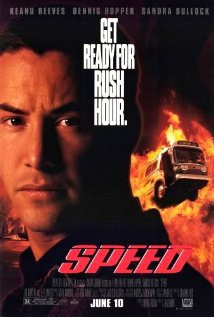
SPEED
US, 1994, 116 minutes, Colour.
Keanu Reeves, Dennis Hopper, Sandra Bullock, Joe Morton, Jeff Daniels, Alan Ruck, Glenn Plummer, Beth Grant.
Directed by Jan de Bont.
Energy is the key word for Speed. And I found that often during the film I was pushing my feet against the floor, vicariously driving and moving with speeding vehicles.
You practically get three films in one. The first 25 minutes to set in a lift, explosives and rescue, very effectively done.
But that is only a curtain raiser .Most of the action is on an ordinary bus, rigged with explosives that will detonate if the bus goes under a certain speed or of any of the passengers get off. A strong premise for exciting action. And it is.
Debut director Jan de Bont has been a director of photography for more than 30 years. His credits include Die Hard, Black Rain, Lethal Weapon 3, Jewel of the Nile, Hunt for Red October. He has not wasted his time and has learnt all the tricks – and, with the effective editing, here they all are.
Keanu Reeves proves to be a more credible hero than Bruce Willis. Dennis Hopper stays calm and quiet, unmannered, to make for a believable villain. Sandra Bullock is at the beginning of her star career and indicates how strong that career would be.Though the plot has holes (which you don’t think about while it is on screen), it is all quite plausibly implausible.
Oh, and there’s another 20 minutes on a speeding train after the bus action!
1. A box-office hit of 1994? The ingredients for success? Action, disaster, rescue, good versus evil? The cast?
2. Los Angeles, the credit sequence and the elevator shaft? the building and the elevator, the offices, the action? Police precincts? The streets, the bus, the freeways? The train and the underground? The musical score?
3. The success and editing for impact of the action sequences: the lift, the rescue, the bus, its speed, the helicopters, the accompanying vehicles? The airport, the crash into the plane? The train, the underground, in the carriages, on the roof?
4. Jack and Harry, police work, their friendship, their boss? Going to the rescue of the people in the elevator? Using their wits? The passengers, executives, fear, handling the situation? Jack and Harry getting them out, the fearful woman and urging her out, the impact of the crash? The encounter with the bomber? The theory of shooting the hostage, Jack shooting Harry in the leg, upsetting the bomber, his escape? Their receiving commendations and metals?
5. Dennis Hopper as the bomber, his past, injuries, a gold watch, his hardships, wanting the money, wanting revenge? His detailed plans, the equipment, the setting up of the elevator? His surviving? The contact with Jack, blowing up the bus? The setup on the bus, the surveillance, his threats about people getting off, his watching? His not realising that the sequence of the bus had been recorded and was playing over and over? Harry and the group going to his house, the bomb blast? His reaction to the passengers being freed? His meeting Annie, taking her, strapping the explosives? The underground, on the train, killing the driver, the threats, going to the roof, his decapitation?
6. Keanu Reeves as Jack? The contact from the bomber? His getting on board the bus, the leads? Assessing the bombs? The phone contact, the information to Harry? Annie driving after the driver was shot? The passengers not being allowed off the bus, the woman and her attempt, the death? His going under the bus, the dangers, getting out and back on the bus? Getting the passengers off, Annie and Jack and the final escape?
7. Annie, racing, getting on the bus, the unwelcome attention of the tourist, the driver being shot, taking over, her liking speed? driving the bus, crashing into the cars, the difficulties, the leap over the missing bridge? Into the airport, the bus crashing into the plane?
8. The driver, wounded, about to get off? The passengers, the tourist and his flirting, his ultimate fear? The scared woman and her death? The man with the gun and afraid of the police, his being overcome? The Hispanic man and his help?
9. Audiences identifying with the action and the adrenaline, the speeds, the bus being held up, not allowed to go under 50 miles an hour, the leap, the airport?
10. The film as a classic of this kind of action show?
Published in Movie Reviews
Published in
Movie Reviews
Tagged under
Saturday, 18 September 2021 19:52
Whiplash/ 2014
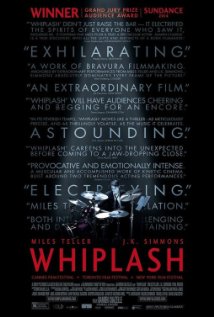
WHIPLASH
US, 2014, 107 minutes, Colour.
Miles Teller, J.K.Simmons, Paul Reiser, Melissa Benoist, Austin Stowell, Chris Mulkey.
Directed by Damian Chazelle.
One of the pieces played often in this film has the title, Whiplash. But Whiplash has overtones of torture, beating, suffering. And that is what happens in this very strong and fascinating film.
The writer-director, Damian Chazelle, studied music himself and draws on his own experience in shaping this story. He brings quite an intensity to the characterisations and conflicts.
Miles Teller, who has appeared in a number of rather obnoxious and forgettable sex comedies, makes his mark as young drummer, Andrew, who hopes to be a top performer. He is at a music college, studies in a band, is overheard one day by the chief director of the school’s main band, Fletcher, played by J. K. Simmons, a fine character actor for many years. This has to be his best performance.
One day, Fletcher marches into the smaller band rehearsal and summons Andrew. At first, Fletcher gives the impression of friendship and encouragement but very soon is too demanding of Andrew, Andrew going too fast, too slow, not the right timing, Fletcher throwing things at him, mocking him about the one tear in his eye… And it goes on from there.
Audiences with movie memories of martinets and the harsh treatment of those under their command may remember Louis Gossett Jr’s treatment of Richard Gere in An Officer and a Gentleman or R. Lee Ermey in Kubrick’s Full Metal Jacket. This is on a par with those performances. There are some moments when Fletcher seems to be human, especially in his grief at a student who has died – but that also has its harsh and bleak sides.
Most of the film is the confrontation between Fletcher and Andrew. At least Andrew has the support of his fond father, Paul Reiser, and, for a short time, dating with a girl who sells tickets at the local cinema. But, Andrew has great perseverance as Fletcher does his best to humiliate him – and the others in the band, especially the fellow-drummers.
The key question is how far should a teacher, a mentor, a parent-figure, put pressure on a student. Towards the end of the film, there is a confronting discussion between teacher and pupil. The teacher says that he does not want his students to be ordinary. He claims that “a good job” is the worst of compliments, being satisfied with the ordinary.
It also raises the question of the teacher, mentor, parent living through the student, a precarious success.
The trouble is that there is some traumatic effect on the student when there is so much pressure from the teacher. For the audience, this is clear in looking at Andrew, his bleeding hands, his intensity and using every moment for practice, cutting off relationships, the consequence of complete dedication to craft and wanting perfection.
So, the film shows both sides of this pressure question and its consequences, confronting the audience and its belief in excellence and achievement as well as feeling towards those whose lives are altered for the worse because of the pressure.
It builds up to a psychological confrontation, a musical confrontation, and a tour-de-force performance by Andrew which makes a difference to Fletcher’s perceptions of him.
For those who appreciate music, especially jazz, the film has a strong score which plays throughout the whole film.
1. Praise for the film, performances? Insight into human nature?
2. The music, jazz, performances, instruments, rehearsals, concerts? Teachers?
3. The title, the musical piece, the implication of whips and torture?
4. Education, teachers and techniques, styles? student-friendly? Demanding more, pressures, emotional brutality, psychological pressure, abuse? Nothing worse than “a good job!”.
5. Miles Teller as Andrew? As a character, as a boy, his memories, getting the drums, his father and his bonding? Performance, playing the drums and Fletcher hearing him? At school, the practice, the band? Fletcher listening, his manner of responding, his exacting and exact choice and use of words? Thinking that Andrew was too glib? His being chosen? Fletcher talking to him, seemingly affectionately? Hope, performance? Playing too fast, playing too slow, Flectcher complaining about the timing, throwing things at Andrew, his comment about the one tear person, the reaction of a nine-year-old girl? Make him assistant to the drummer, turning the pages, the reaction of the others? His dealing with the insults?
6. Meeting the girl at the cinema, going to the movies with his father, enjoying them, his being tongue-tied, asking the girl to go out, their date? His response to the girl, his changing, becoming awkward, the pressure on him and telling her there would be no more dates? His intense practice, drawing blood on his hands? Fletcher and his insulting others, the original performer? Making them vie with each other for success? Intensity, the time taken, proving himself? The story of the violinist, successful student, Fletcher’s grief at the phone call, the man’s death? Hearing the true story, the man hanging himself, the effect on Andrew, the interview, the boy’s mother, asked to give information against Fletcher? Fletcher gone from the school? Andrew playing, giving up? His meeting Fletcher in the street, the coffee, invited to play, Fletcher humiliating him? His father’s presence and support? Defying Fletcher, the scene, walking out, going back? The interactions, Fletcher knowing that he could be a good player, Andrew and his tour-de-force of performance? Fletcher acknowledging this? Andrew’s achievement? At what cost?
7. The implications of the teacher, mentor pressurising for excellence, not just “a good job”? The psychological and traumatic effect on the student? As illustrated by the violinist killing himself?
8. Fletcher, no story of his background, wearing black, his hearing Andrew play, talking with him, the invitation, coming into the class and singling out Andrew? The interview with him, the exact words, seemingly encouraging? Insulting him, the test, throwing things at him, mocking him, being pleasant, not? The verbal and psychological violence? His grief at the death of the young man? The times rehearsals, urging the 3 to compete with each other, his demands? His being dismissed? Meeting Andrew, talking about the dismissal, then saying that he knew that it was Andrew who informed? The invitation, the prestige of the concert, Fletcher and the musicians, conducting, Andrew and mis-timing, the humiliation, the confrontation, Andrew walking out? Fletcher and his response to Andrew’s jamming, encouraging him, a final smile?
9. Andrew’s father, a good man, supporting his son, going to the movies, feeling for his being insulted, going to the concert, encouraging him?
10. The other musicians, on the receiving end from Fletcher, his taunts, humiliations, making them compete, the young man encouraged to take Andrew’s place, and then humiliated?
11. The girl, at the cinema, the dates, her hopes, the cut-off, her telling Andrew off?
12. The quality of the film, the story, characters, the music, the intensity of the confrontations?
Published in Movie Reviews
Published in
Movie Reviews
Tagged under